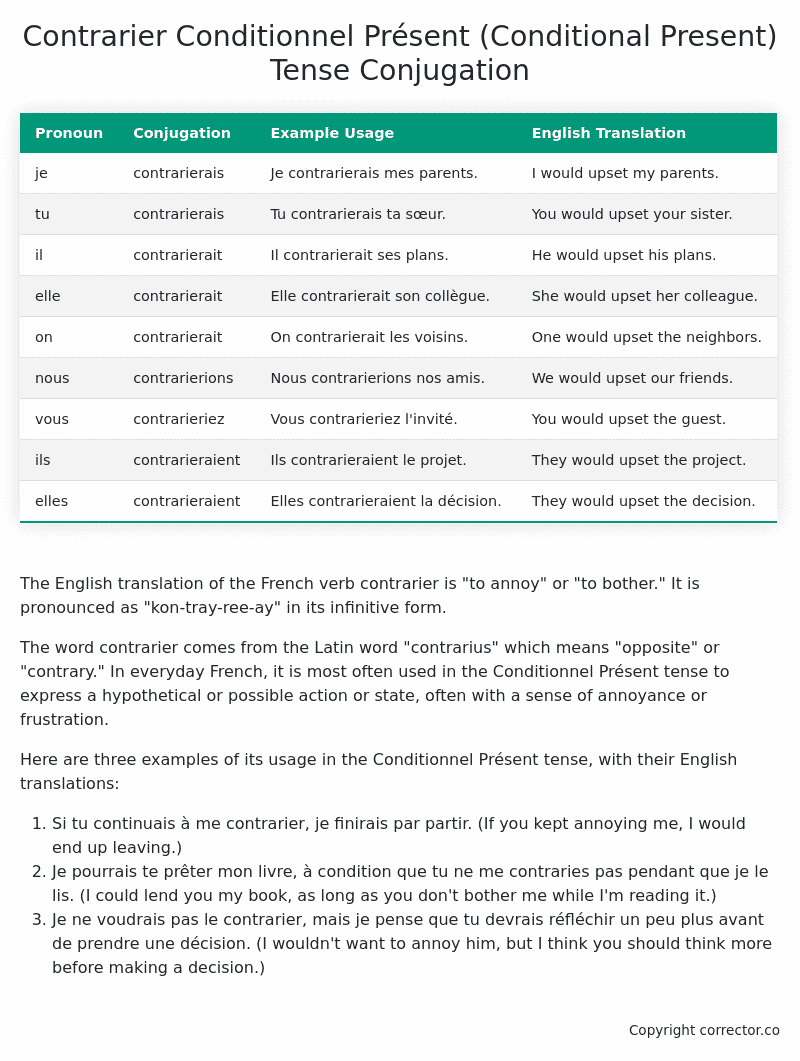Conditionnel Présent (Conditional Present) Tense Conjugation of the French Verb contrarier
Introduction to the verb contrarier
The English translation of the French verb contrarier is “to annoy” or “to bother.” It is pronounced as “kon-tray-ree-ay” in its infinitive form.
The word contrarier comes from the Latin word “contrarius” which means “opposite” or “contrary.” In everyday French, it is most often used in the Conditionnel Présent tense to express a hypothetical or possible action or state, often with a sense of annoyance or frustration.
Here are three examples of its usage in the Conditionnel Présent tense, with their English translations:
- Si tu continuais à me contrarier, je finirais par partir. (If you kept annoying me, I would end up leaving.)
- Je pourrais te prêter mon livre, à condition que tu ne me contraries pas pendant que je le lis. (I could lend you my book, as long as you don’t bother me while I’m reading it.)
- Je ne voudrais pas le contrarier, mais je pense que tu devrais réfléchir un peu plus avant de prendre une décision. (I wouldn’t want to annoy him, but I think you should think more before making a decision.)
Table of the Conditionnel Présent (Conditional Present) Tense Conjugation of contrarier
| Pronoun | Conjugation | Example Usage | English Translation |
|---|---|---|---|
| je | contrarierais | Je contrarierais mes parents. | I would upset my parents. |
| tu | contrarierais | Tu contrarierais ta sœur. | You would upset your sister. |
| il | contrarierait | Il contrarierait ses plans. | He would upset his plans. |
| elle | contrarierait | Elle contrarierait son collègue. | She would upset her colleague. |
| on | contrarierait | On contrarierait les voisins. | One would upset the neighbors. |
| nous | contrarierions | Nous contrarierions nos amis. | We would upset our friends. |
| vous | contrarieriez | Vous contrarieriez l’invité. | You would upset the guest. |
| ils | contrarieraient | Ils contrarieraient le projet. | They would upset the project. |
| elles | contrarieraient | Elles contrarieraient la décision. | They would upset the decision. |
Other Conjugations for Contrarier.
Le Present (Present Tense) Conjugation of the French Verb contrarier
Imparfait (Imperfect) Tense Conjugation of the French Verb contrarier
Passé Simple (Simple Past) Tense Conjugation of the French Verb contrarier
Passé Composé (Present Perfect) Tense Conjugation of the French Verb contrarier
Futur Simple (Simple Future) Tense Conjugation of the French Verb contrarier
Futur Proche (Near Future) Tense Conjugation of the French Verb contrarier
Plus-que-parfait (Pluperfect) Tense Conjugation of the French Verb contrarier
Passé Antérieur (Past Anterior) Tense Conjugation of the French Verb contrarier
Futur Antérieur (Future Anterior) Tense Conjugation of the French Verb contrarier
Subjonctif Présent (Subjunctive Present) Tense Conjugation of the French Verb contrarier
Subjonctif Passé (Subjunctive Past) Tense Conjugation of the French Verb contrarier
Subjonctif Imparfait (Subjunctive Imperfect) Tense Conjugation of the French Verb contrarier
Subjonctif Plus-que-parfait (Subjunctive Pluperfect) Tense Conjugation of the French Verb contrarier
Conditionnel Présent (Conditional Present) Tense Conjugation of the French Verb contrarier (this article)
Conditionnel Passé (Conditional Past) Tense Conjugation of the French Verb contrarier
L’impératif Présent (Imperative Present) Tense Conjugation of the French Verb contrarier
L’infinitif Présent (Infinitive Present) Tense Conjugation of the French Verb contrarier
Struggling with French verbs or the language in general? Why not use our free French Grammar Checker – no registration required!
Get a FREE Download Study Sheet of this Conjugation 🔥
Simply right click the image below, click “save image” and get your free reference for the contrarier Conditionnel Présent tense conjugation!

Contrarier – About the French Conditionnel Présent (Conditional Present) Tense
Formation
Common Everyday Usage Patterns
Expressing Polite Requests
Expressing Hypothetical Situations
Expressing Doubt or Uncertainty
Interactions with Other Tenses
Present Tense
Past Tense
Future Tense
Conditional Perfect
Summary
Want More?
I hope you enjoyed this article on the verb contrarier. Still in a learning mood? Check out another TOTALLY random French verb conjugation!


